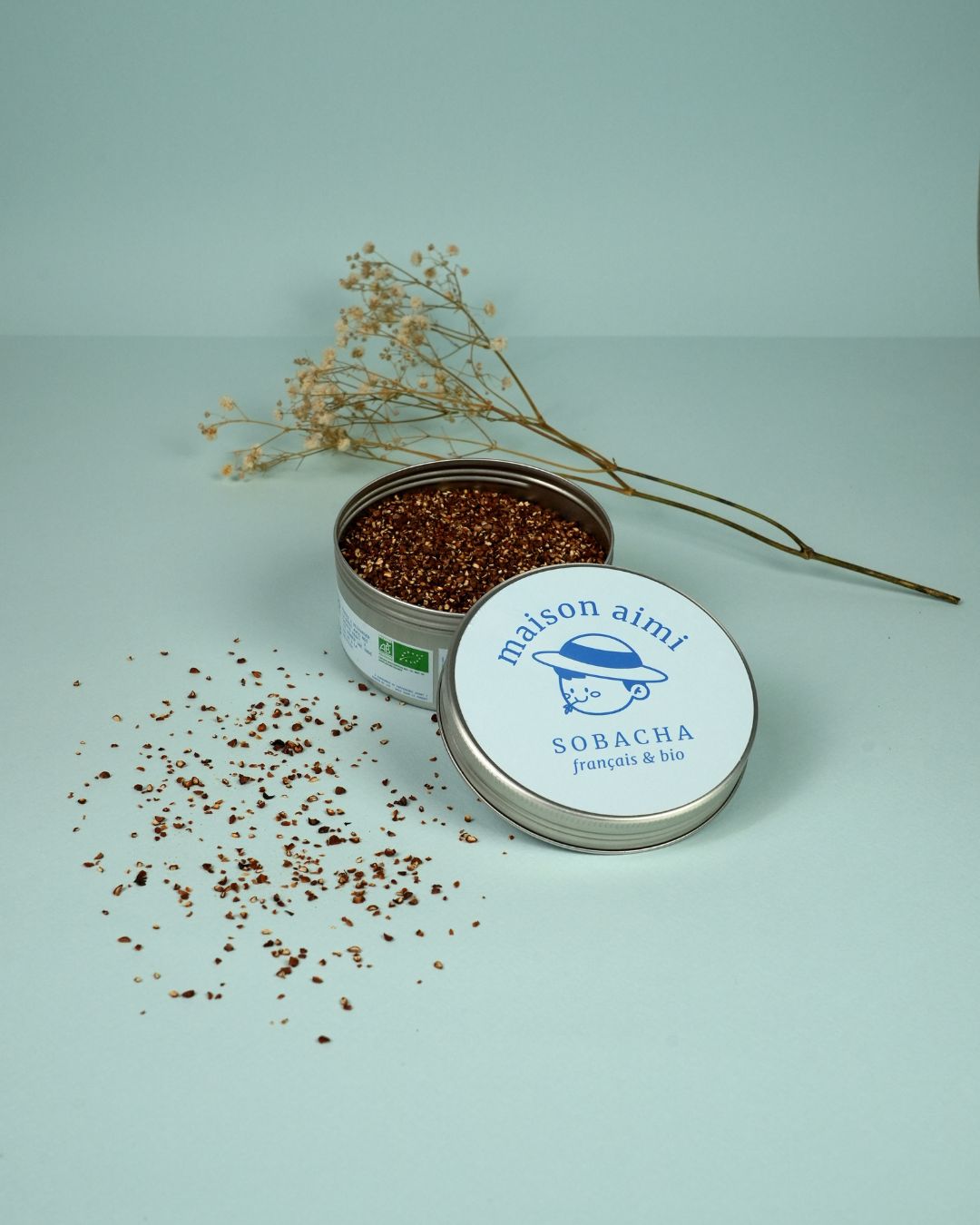Drinks and white teeth: we tell you everything!
Tea, coffee, red wine, soda: many drinks stain teeth right after drinking them. Why do these drinks make teeth yellow and, more importantly, do they really make them yellow in the long term? How can you avoid having yellow teeth when drinking tea and coffee? What drinks should you drink to keep your teeth white? As a brand specializing in the development of beverages, Maison Aimi has inevitably asked itself the question for you: find all our answers and solutions in this article!

Summary
Why do some drinks turn teeth yellow?4 drinks that don't stain your teeth
6 tips to limit yellow teeth linked to drinks
Why do some drinks turn teeth yellow?
Many drinks stain teeth for three reasons: they are high in dyes, high in tannins, or high in acidity.
#1 Dyes, natural or not
The first reason why drinking certain hot drinks can turn teeth yellow is simply the presence of a colorant, whether natural or not . The colorant will stick to the tooth enamel and gradually color it.
Thus, the golden latte, a drink made from vegetable milk and turmeric, will tend to yellow the teeth due to the presence of this spice. As for the pink latte, a drink made from beetroot, it can also stain the teeth because of the pronounced color of the beetroot.
While the color of these two drinks is natural, drinks can also be colored artificially. This is the case with coke, whose acidity and artificial coloring are an explosive cocktail for yellowing teeth, but also syrups (grenadine, mint) rich in artificial colorings.
#2 The presence of tannins, these agents which stain teeth
The second reason why some drinks stain teeth is less well known. It is the presence of tannins in some drinks.
Tannin, or tannins or tannins, are found in all plants. They are molecules from the polyphenol family that help protect plants. They take a different chemical form depending on the plant from which they come. So there is not one tannin but a multitude of different tannins!
It is the acidity of certain tannins that has the effect of yellowing teeth. They are found in particular in tea, coffee and wine. The yellowing effect of tannins will be all the stronger if the tannins are numerous and concentrated in the drink.
H4 Drinks that contain tannin
Tannins are found in:
- Tea: Black teas and some green teas contain tannins. These are what give them a slightly bitter and astringent flavor, especially if the tea is steeped too long. White teas are lower in tannins, hence their rounder flavor.
- Matcha: Matcha is a powdered form of green tea. It also contains tannins but at a relatively lower level than black teas or some other green teas. The tannins in matcha contribute to its bitterness, although its high amino acid content limits this.
- Red Wine: Red wine is high in tannins, primarily from the skins, seeds, and sometimes stems of the grapes. Tannins give the wine a thick feel and can contribute to its complexity and aging potential. Wines high in tannins are called “tannic wines.”
- Mate: Mate is a traditional South American infusion made from the leaves of Yerba mate that is very rich in caffeine and tannins . These compounds influence its taste, particularly its astringency and bitterness, in a similar way to other drinks such as tea and wine.
- Coffee: Coffee contains tannins, although in smaller amounts compared to wine and tea. They can contribute to the bitterness of coffee, especially if it is brewed too long or is of poor quality.
- Cider: Some craft ciders, especially those made with high-tannin apples (like traditional cider apples), can have a noticeable presence of tannins, resulting in a drier, rougher texture on the tongue.
- Dark Chocolate: Dark chocolate also contains tannins that contribute to its bitterness. These come mainly from the cocoa beans used to make the chocolate. The higher the percentage of cocoa, the more tannins the dark chocolate is likely to have.
#3 The presence of acidity
The third and final reason that can explain why a drink can turn teeth yellow is its acidity. This will contribute to attacking the tooth enamel, weakening it and coloring it.
Whether the acidity of the drink is natural or artificial makes little difference. That is why a squeeze of lemon juice in lukewarm water can be just as corrosive as a glass of Coca-Cola. Both drinks are particularly acidic and can therefore contribute to yellowing of teeth.
4 drinks that don't stain your teeth
Drinks that do not stain teeth have three characteristics: they are slightly colored, are not acidic and do not contain tannins. Here are four types of drinks that combine these characteristics.
#1 Cereal infusions
Cereal infusions are very low in tannins. Naturally little colored, they do not stain teeth. Cereal infusions are widely consumed throughout the world.
Buckwheat infusion
Very popular in Brittany and Russia, buckwheat infusion has also found a large audience in Japan, where it is called Sobacha. It is made from hulled buckwheat. Its taste is often compared to that of roasted hazelnuts. It can be drunk hot or cold and, because it does not contain tannins, it can be infused cold (it will never become bitter).
At Maison Aimi, as a Japan enthusiast, we were keen to develop our own sobacha , from French and organic farming. We hope you will enjoy it.

Barley infusion
Called mugicha (in Japan), boricha (in Korea) or caffè d'orzo (in Italian), barley infusion is a drink made from the infusion of roasted and crushed barley grains. Its taste is delicate and close to coffee, with an aftertaste of roasted cereals. Because barley does not contain tannins, the infusion can be infused for a very long time without ever becoming bitter - which allows it to be infused to your taste.
At Maison Aimi, we have developed our own range of French and organic mugicha , based on Japanese know-how. Discover it without delay.

Herbal infusions
Herbal infusions such as chamomile, verbena, linden or valerian contain little or no tannins. This is also why you can let them brew for a long time without them becoming bitter or a deposit forming on top.
💡 If you are trying to avoid staining your teeth as much as possible, avoid infusions flavored with red fruits or lemon. Their color and natural acidity will indeed contribute to staining your teeth if consumed regularly.
Rooibos
Rooibos is an infusion made from the leaves of Aspalathus linearis , a plant native to South Africa. Although it is often called “red tea” because of its red color, rooibos is unique because it is tannin-free , or at least contains very few. This is why you can let it brew for a long time without it becoming bitter.
Hot chocolate (without dark chocolate)
While dark chocolate is high in tannins, milk chocolate is not. This is why chocolate milk drinks (made from melted chocolate or chocolate powder) will not tend to stain your teeth. However, they are very high in sugar and, as such, may not be good for your teeth. This is why we recommend them occasionally and followed by brushing your teeth.
6 tips to limit yellow teeth linked to drinks
As you will have understood by reading our article: drinks (and many foods) can contribute to coloring tooth enamel in the long term. To limit the yellowing of teeth, find our 7 tips here:
- Brushing your teeth after every meal and after drinking your favorite beverages is the best tip to protect your teeth. It is recommended to do it within 30 minutes after eating to reduce the risk of tooth enamel erosion.
- Use a straw to drink your cold drinks. This will prevent the drink from coming into direct contact with your teeth and will protect them. At Maison Aimi, we have developed reusable glass straws to allow you to enjoy your drinks without generating waste. They come with their cleaning brush to guarantee perfect hygiene!
- Drink a glass of water after drinking your favorite hot beverages to pre-clean your mouth.
- Since acidity is your enamel's main enemy, rebalancing the acidity in your mouth by eating foods with a basic pH like apples can work to whiten your teeth. Baking soda also has a whitening effect (you'll probably see this tip online) but it can contribute to tooth damage if you don't use it correctly: ask your dentist for advice.
- Use a suitable toothpaste to reduce stains, limit yellowing of teeth and maintain white teeth.
- Visit a dentist regularly: To maintain good oral health, visiting your dentist at least once a year is essential. He or she will perform the necessary care and may offer you other tips for keeping your teeth white.
Food colorings, whether natural or not, as well as tannins and acidity contribute to making drinks stain teeth. This is particularly the case for tea and coffee, drinks consumed by many on a daily basis. If the color of your teeth is important to you, you can of course put different solutions in place but also turn to drinks that do not stain teeth, such as cereal infusions.


